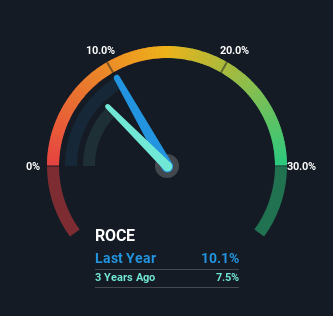- United States
- /
- Hospitality
- /
- NYSE:QSR
Restaurant Brands International's (NYSE:QSR) Returns Have Hit A Wall

If we want to find a potential multi-bagger, often there are underlying trends that can provide clues. In a perfect world, we'd like to see a company investing more capital into its business and ideally the returns earned from that capital are also increasing. Ultimately, this demonstrates that it's a business that is reinvesting profits at increasing rates of return. Having said that, from a first glance at Restaurant Brands International (NYSE:QSR) we aren't jumping out of our chairs at how returns are trending, but let's have a deeper look.
What Is Return On Capital Employed (ROCE)?
Just to clarify if you're unsure, ROCE is a metric for evaluating how much pre-tax income (in percentage terms) a company earns on the capital invested in its business. Analysts use this formula to calculate it for Restaurant Brands International:
Return on Capital Employed = Earnings Before Interest and Tax (EBIT) ÷ (Total Assets - Current Liabilities)
0.10 = US$2.1b ÷ (US$23b - US$2.1b) (Based on the trailing twelve months to December 2023).
So, Restaurant Brands International has an ROCE of 10%. That's a pretty standard return and it's in line with the industry average of 9.5%.
See our latest analysis for Restaurant Brands International

Above you can see how the current ROCE for Restaurant Brands International compares to its prior returns on capital, but there's only so much you can tell from the past. If you're interested, you can view the analysts predictions in our free analyst report for Restaurant Brands International .
What Can We Tell From Restaurant Brands International's ROCE Trend?
Over the past five years, Restaurant Brands International's ROCE and capital employed have both remained mostly flat. This tells us the company isn't reinvesting in itself, so it's plausible that it's past the growth phase. So don't be surprised if Restaurant Brands International doesn't end up being a multi-bagger in a few years time. That being the case, it makes sense that Restaurant Brands International has been paying out 62% of its earnings to its shareholders. If the company is in fact lacking growth opportunities, that's one of the viable alternatives for the money.
The Key Takeaway
In summary, Restaurant Brands International isn't compounding its earnings but is generating stable returns on the same amount of capital employed. Although the market must be expecting these trends to improve because the stock has gained 43% over the last five years. Ultimately, if the underlying trends persist, we wouldn't hold our breath on it being a multi-bagger going forward.
Restaurant Brands International does come with some risks though, we found 3 warning signs in our investment analysis, and 1 of those is a bit unpleasant...
For those who like to invest in solid companies, check out this free list of companies with solid balance sheets and high returns on equity.
New: AI Stock Screener & Alerts
Our new AI Stock Screener scans the market every day to uncover opportunities.
• Dividend Powerhouses (3%+ Yield)
• Undervalued Small Caps with Insider Buying
• High growth Tech and AI Companies
Or build your own from over 50 metrics.
Have feedback on this article? Concerned about the content? Get in touch with us directly. Alternatively, email editorial-team (at) simplywallst.com.
This article by Simply Wall St is general in nature. We provide commentary based on historical data and analyst forecasts only using an unbiased methodology and our articles are not intended to be financial advice. It does not constitute a recommendation to buy or sell any stock, and does not take account of your objectives, or your financial situation. We aim to bring you long-term focused analysis driven by fundamental data. Note that our analysis may not factor in the latest price-sensitive company announcements or qualitative material. Simply Wall St has no position in any stocks mentioned.
About NYSE:QSR
Restaurant Brands International
Operates as a quick-service restaurant company in Canada, the United States, and internationally.
Established dividend payer and good value.


